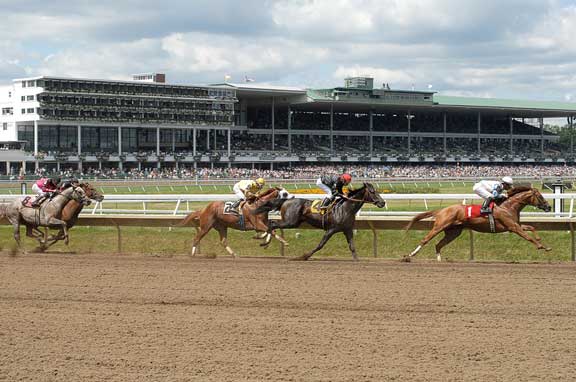By T. D. Thornton
No one is ever going to confuse the Mid-Atlantic Thoroughbred Championships (MATCH) series with the Triple Crown in terms of widespread appeal and star-infused marketing power. But last week's announcement that the May-through-September regional schedule of stakes races has been put back together after having disintegrated more than a decade and a half ago is a pretty remarkable feat for a key region of United States racing that had been on unsteady footing not too long ago.
Make no mistake: The Maryland Jockey Club (Pimlico Race Course and Laurel Park), Monmouth Park, Delaware Park, Penn National, Parx, and Presque Isle Downs are all competitors from a business perspective. But the revitalization of the popular regional series, which in 2018 will feature a $450,000 bonus pool for owners and trainers atop a $2.9 million stakes structure, demonstrates a much-needed spirit of cooperation in the region that has the densest geographic clustering of Thoroughbred tracks in the nation.
What has changed since the series last ran for a five-year stint starting in 1997 to make it viable again today? Alan Foreman, the creator of the MATCH concept and chairman of the Thoroughbred Horsemen's Association (THA), offered these insights beyond what he told TDN when the story was first reported last Tuesday.
“There were lots of problems in the region,” Foreman said. “Maryland, five or six years ago, was on the verge of collapse. The [New Jersey Governor Chris] Christie administration privatized Monmouth, and Monmouth didn't know if it would survive. Delaware Park fell on somewhat hard times with competition from gaming that had been legalized in Maryland and Pennsylvania.
“For a series like MATCH to be successful, it requires everyone working together and pulling in the same direction to raise the money necessary to do it, and that just wasn't possible,” Foreman continued. “We tried in 2011, and it really didn't go anywhere. We started to get expressions of interest, and we came very close in 2014 to putting MATCH back together. But we just couldn't pull together the money that was necessary to make it work.
“We, as a region, meet collectively every year in March to talk about what we can do to help this industry move forward. And during 2017, everyone had a pretty good year,” Foreman continued. “There was a lot of enthusiasm about the direction of racing in the region. And the other thing is that the horsemen's organizations and the tracks and the regulators and the stakeholders in the past five years in the mid-Atlantic have been working collectively toward uniformity and on integrity, health, welfare, and safety issues. And I think that there was a collective sense after last year's meeting that we could perhaps translate this more on the racing side, and try to do things with coordination of schedules that might bring a thing like the MATCH series back.”
Representatives of the mid-Atlantic tracks met in Delaware again this past October, when MATCH gained further traction. By December, the concept had crystallized. The complete schedule and rules can be viewed here.
“The stars really aligned here. And I can't overestimate the relationships that have developed as we've worked together in the mid-Atlantic,” Foreman said. “At the end of the day, the tracks all compete against each other. They have their own brands. They're dependent upon the success of their own racing programs. And in the mid-Atlantic we have intense competition for horses, particularly in the summertime because we have so many tracks running. We've had a decline in the number of horses in the overall horse inventory. We had a decline in horse ownership. So I think we're now in a position where it makes sense for us to be talking about trying not only to promote the industry and mid-Atlantic racing, but also to start thinking about how we can work with each other to make it work for everybody. And that was the spirit that led everyone to get together.
“We let the racing directors design the series,” Foreman continued. “We let them talk together to decide what divisions would work best. It took a lot of time, a lot of cooperation, and a lot of effort. And now you see the product of this effort. There's no other event of this type in the industry, and we think that it's going to be a catalyst for the mid-Atlantic to be working together on other issues as well.”
Purse news, Bonuses Elsewhere
Other circuits might be starting to think the same way as the mid-Atlantic. In the Pacific northwest, Hastings Racecourse in Vancouver, British Columbia, and Emerald Downs near Seattle, Washington, struck a deal earlier this month to team up for the Northwest Triple, which will award a $100,000 bonus to the connections of any horse that sweeps a new three-race series comprised of the relevant three-year-old stakes series in that region.
The Northwest Triple also awards lesser-denomination participation bonuses designed to boost field size. And a separate series provides $25,000 incentives for sweeping stakes races at both tracks in other divisions, including a bonus that involves the region's premier stakes, the GIII Longacres Mile (full explanation of both series here).
Gulfstream Park announced Friday that it will increase overnight purses 10% beginning Wednesday, Mar. 7 through the end of the Championship Meet Sunday, Apr. 1.
The New York Racing Association recently announced that plans are in place for a Ship & Win program that will offer a 30% purse boost (except for stakes races), as well as a $1,500 shipping stipend for horses who ship in from Oaklawn Park and race at Aqueduct's spring meet or the Belmont Park spring/summer meets. Also, horses that have raced at Gulfstream Park or Tampa Bay Downs may be eligible for a $1,500 shipping subsidy for the Aqueduct spring meet.
Read details here.
Not a subscriber? Click here to sign up for the daily PDF or alerts.






